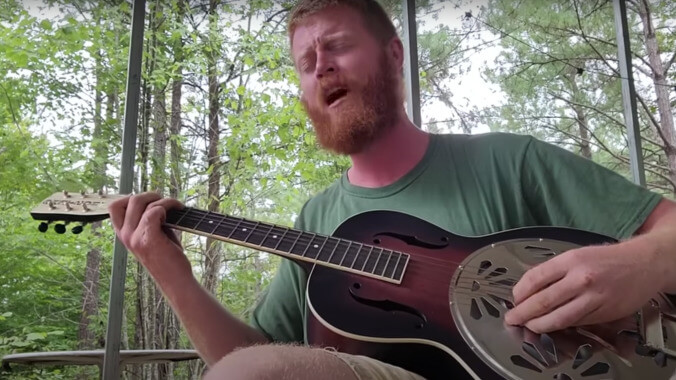What is "Rich Men North of Richmond" and why is it suddenly everywhere?
The viral country hit by relatively unknown artist Oliver Anthony was shared by multiple conservative personalities over the weekend

“People like me and people like you” have a new anthem—that is if you’re one of the 9.2 million people who watched the premiere of relatively unknown country artist Oliver Anthony’s song “Rich Men North Of Richmond” over the weekend. And while one might hope a song with the above lyric might be an ode to unity in our divided country à la “Imagine,” the reality—as you can probably guess—is less sunny.
The song comes from Oliver Anthony (Oliver Anthony Music on streaming platforms), an aspiring farmer who lives with his three dogs in Farmville, Virginia. While the raspy-voiced artist had amassed a modest following through blue-collar anthems such as “Ain’t Gotta Dollar” and “I’ve Got To Get Sober” (which he apparently recorded on his cell phone), “Rich Men North Of Richmond”—a self-professed ode to “the working class and your average hard-working young man who may have lost hope in the grind of trying to get by”—is his first bona fide hit.
In the single week since Anthony released the song last Tuesday, it has soared to number one on both the iTunes General chart and the iTunes Country chart, knocking Jason Aldean’s similarly contentious “Try That In A Small Town” all the way down to number five (behind two other Oliver Anthony Music tracks, no less). Anthony currently holds 18 out of 40 slots on the Country list, and, as of this writing, the song sits at number 9 on the US Spotify Top 50. But if you’d never heard of him before this weekend, you certainly wouldn’t be alone. While Anthony was previously a small artist by any metric (i.e. the phone-recorded songs), one telling comparison is Spotify monthly listeners, for which Anthony currently sits at 889,435, just 8% of Jason Aldean’s 11 million. (It’s unclear how much this number has increased in the past week.)
So, how did this happen?
It’s largely conservatives. Even though Anthony said in a recently shared introduction video that he “sit[s] pretty dead center down the aisle on politics” (“Both sides serve the same master, and that master is not someone of any good to the people of this country”), right-wing artists and politicians like John Rich and Kari Lake have blasted the song out in a big way. Conservative commentator Matt Walsh was perhaps the most high-profile promoter, writing, “The main reason this song resonates with so many people isn’t political. It’s because the song is raw and authentic.” This may be partly true—the guy has an undeniably good voice—but is the song really resonating with people just because Anthony is, in Walsh’s words, a “guy in the woods pouring his heart over his guitar”? Of course not.
What is the song actually about?
Like Jason Aldean before him, Anthony is using a lot of, let’s say “vague” language to describe a song whose lyrics do all the real talking for him. “Maybe that is the problem today, is we just don’t talk enough common sense anymore, you know? We kind of went a little off the deep end,” he said in his intro video. And, sure, it’s hard to disagree with that on principle, but let’s take a look at the kind of “common sense” Anthony is talking about together. Here’s the song’s second verse:
I wish politicians would look out for miners / And not just minors on an island somewhere
Lord, we got folks in the street, ain’t got nothin’ to eat / And the obese milkin’ welfare
Well, God, if you’re 5-foot-3 and you’re 300 pounds / Taxes ought not to pay for your bags of fudge rounds
Young men are puttin’ themselves six feet in the ground / ‘Cause all this damn country does is keep on kickin’ them down
While that first couplet is frankly pretty baffling in its own right, it becomes even more confounding taking into account that Anthony says the song is him “[drawing] the line on being quiet when I started to see [human trafficking] becoming normalized,” which he called “one of the worst things that a human being can do.” This lyric sounds like… the exact opposite of that.
Further, the title of the song is, shall we say, open to interpretation. On one hand, Washington, D.C. is directly north of Richmond, implying that—in line with Anthony’s self-declared centrism—the song is merely a screed against powerful politicians taking from the working man. But as some on lyric site Genius and elsewhere have pointed out, Richmond was also the capital and northernmost city in the Confederacy. So, in that case, rich men north of Richmond would be… everyone in the North, which obviously paints a far grimmer picture.
While the lyrics may not be as blatantly threatening as “Try That In A Small Town,” they’re generally still based on a number of regressive and gross stereotypes that are filtering into mainstream music in a frightening way. While Aldean’s hit may have recently suffered a near-historic Billboard chart decline, it looks like its after-shocks aren’t over yet.